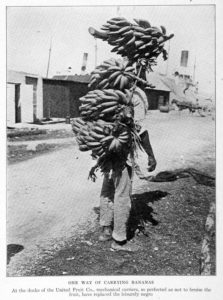Winter 2018-2019 Artist-in-Residence
Get Free: An Abolitionist Framework Applied To All Things
A two-part installation presented by artist in residence gloria galvez
For A World Without Prisons: Visual Resistance as Abolitionist Strategy
co-curated by Critical Resistance and gloria galvez | February 1-10th
Opening: Friday, February 1, 6–9 pm
gloria galvez: Going Bananas | March 1-31
Opening: Friday, March 1, 6–9 pm
As our Winter 2019 artist in residence, gloria galvez’s work will examine carceral frameworks in our society and highlight the political movements working to dismantle both material and abstract forms of imprisonment. This endeavor will be catalyzed by an onsite collaboration with Critical Resistance, a grassroots organization working to build a mass movement to abolish the prison-industrial-complex. With CR, galvez presents For A World Without Prisons: Visual Resistance as Abolitionist Strategy, which consists of a co-curated flyer, photo, banner, t-shirt, flag and poster array from CR’s archive. The items exhibit over two decades (1997–2018) of visual strategies utilized by CR members, staff, and coalitions, in their campaigns and projects to stop prison and jail expansion, eliminate the violence of policing, and build a movement for abolition. Each piece highlights key abolitionist interventions, demands, grievances, and desires towards a world without prisons. During this installation, Critical Resistance, its local CR Los Angeles chapter, and guest partners will facilitate a creative and celebratory series of abolitionist education, outreach, fundraising and networking programs at WCCW.
The latter exhibit Going Bananas consists of a solo body of work, in which galvez conceptualizes a dematerialized prison by considering the peculiarly problematic history and contemporary condition of bananas sold to western countries. She traces the bananas’ colonial history right through their market value-position and into their impending extinction. But along the line of this narrative, galvez also spotlights the moments in which the banana’s invisible prison has trapped other beings, including people. The work poses the banana’s iconic status (for patriarchy, power, state, racism, and capital) as an extension of this carceral state. In an act of abolition and solidarity, galvez subverts these open air prisons by platforming the bananas’ agency and vibrant history.
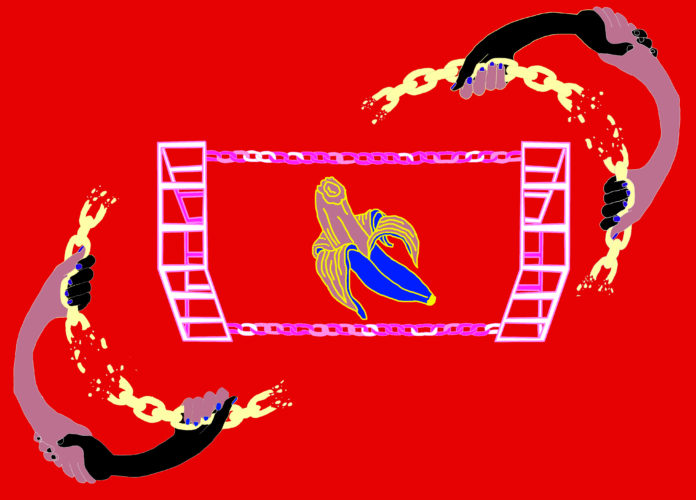
gloria galvez maintains a practice of disrupting, subverting, and dismantling bland and oppressive status-quo norms and realities. Within this theme, her current focus is invoking alternate and simultaneous realities that prompt questions to the social-political conditions of things–both living and nonliving things–both human and non-human things. From such a body of work, the notion of a counterintuitive political solidarity and inter-identification with all living things (human & non-human) and non-living things (natural & non-natural) has risen.
She holds an MFA in Photo & Media from CalArts and a BA in Chicanx and Latinx Studies from CSULB and is a 2019 student of the Mountain School of the Arts (MSA). galvez has organized with Critical Resistance, Youth Justice Coalition, at land’s edge and currently with Mutual Aid Action Los Angeles (M.A.A.L.A). And her work has been exhibited at various Los Angeles art and community venues like Los Angeles Municipal Art Gallery, East Seventh Punx, Human Resources, Art in the Park, NAVEL, Mike Kelley’s Mobile Homestead at Geffen MOCA and Chuco’s Justice Center.
Recently, she presented at the International Gathering of Politics, Art, Sports, and Culture for Women in Struggle hosted by Ejército Zapatista de Liberación Nacional (EZLN) and taught a CalArts Practicum. She is a recipient of the ACE Grant from Rema Hort Mann Foundation, an activist student scholarship from Davis-Putter and a special recognition for community organizing from the Youth Justice Coalition.
Read an essay written for by artist Carolina Caycedo about gloria galvez’s work here.
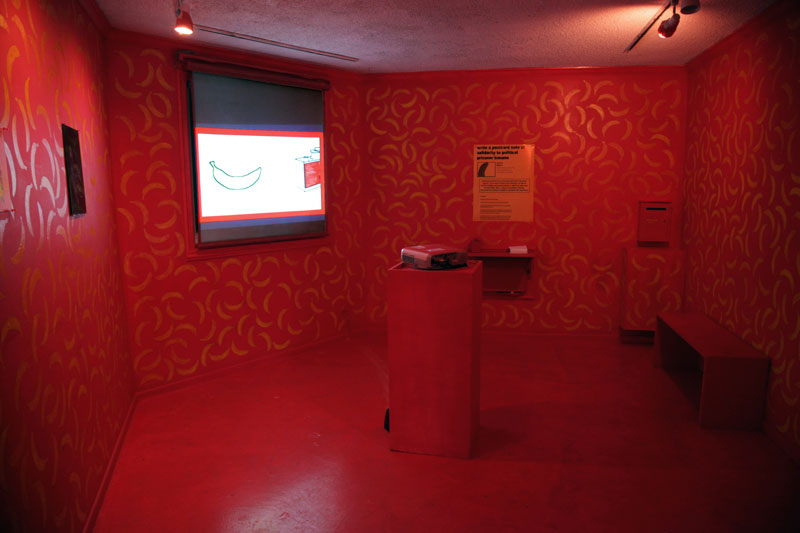
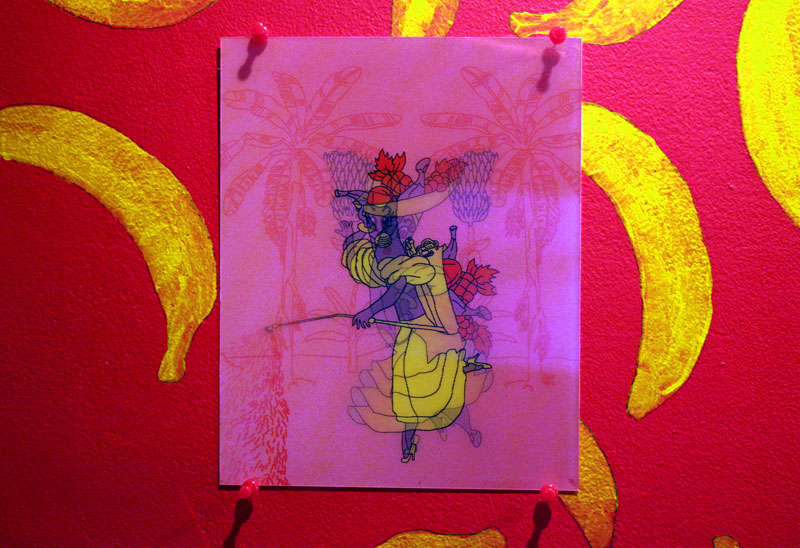
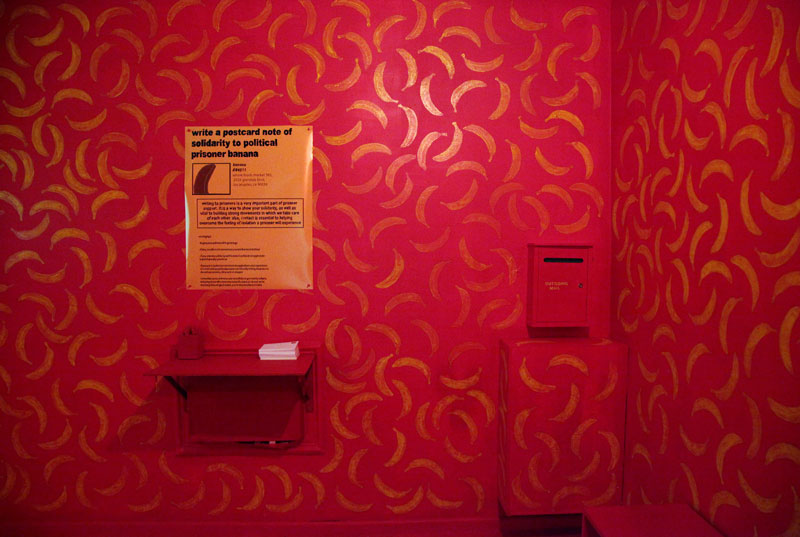
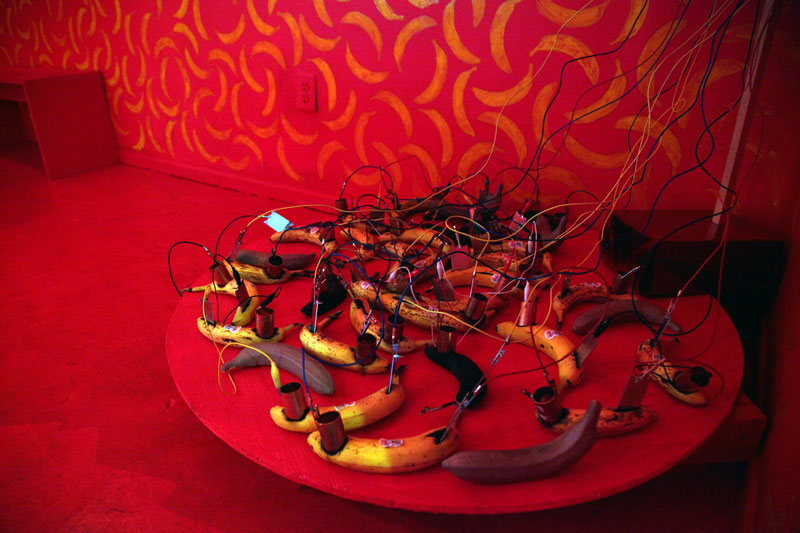
Events & Workshops
For a World Without Prisons reception
and The Abolitionist newspaper release party
Friday, February 1, 2019, 7–10pm
Free
Opening celebration for For a World Without Prisons, a visual archival installation and series of programs co-curated by Critical Resistance (CR), a grassroots organization working to build a mass movement across the nation to abolish the prison-industrial-complex, and gloria galvez. More info & RSVP
Introduction to Prison Industrial Complex & Abolition workshop
Saturday, February 2, 11am–3pm
Presented by Critical Resistance
Free
Critical Resistance invites organizers, educators, and everyday people to join them for one of their most popular introductory workshops: Intro to the Prison Industrial Complex (PIC) and Abolition workshop. This workshop is a great opportunity for people curious to learn more about PIC abolition, for people engaged in campaigns against imprisonment and policing, for people who are directly impacted by state violence to become more confident and empowered to join resistance efforts, and for folks who want to join Critical Resistance as a member. More info & RSVP
Abolition of Policing Workshop
Saturday, February 9, 11am–3pm
Free
Presented by Critical Resistance Critical Resistance Los Angeles (CRLA) will be holding an Abolition of Policing workshop for people who want to build skills and analysis to resist policing! This workshop is a great intro workshop for people who are already involved in campaigns, projects and practices focused on eliminating the violence of policing, as well as folks curious and ready to join the movement. More info & RSVP
For a World Without Prisons closing
and abolitionist poetry and performance
Sunday, February 10, 7pm–10pm
Presented by Critical Resistance and gloria galvez
Free
Please join us for a night of abolitionist poetry and movement hosted by Critical Resistance and gloria galvez, poets Vanessa Huang, Micah Bournes, Ra Avis, Alyssa Matuchniak, Christina Brown and choreographer Suchi Branfman and Lukaza Branfman-Verissimo. For a World Without Prisons will uplift local organizing against imprisonment in Los Angeles and leave the audience inspired to build toward community safety, health and liberation. More info & RSVP
Opening for gloria galvez: Going Bananas
Friday, March 1, 6-9pm
Free
Opening celebration for gloria galvez’s installation Going Bananas, a solo body of work, in which galvez conceptualizes a dematerialized prison by considering the peculiarly problematic history and contemporary condition of bananas sold to western countries. She traces the bananas’ colonial history right through their market value-position and into their impending extinction. But along the line of this narrative, galvez also spotlights the moments in which the banana’s invisible prison has trapped other beings, including people.
From the Blood of Savages comes the Mythos of huMAN
Saturday, March 2, 1pm–3pm
Presented by gloria galvez and edxi betts
Free / Please RSVP
A performance by edxi betts followed by a conversation between edxi and gloria galvez.
Bulla Presenta: Musa Flaunt
Tuesday, March 26, 7pm–10pm
Presented by Roy Martinez and gloria galvez
$5 (no one will be turned away for lack of funds)
A fashion crafting session with banana-leaves ending in an impromptu banana-foliage-garb photo shoot.
Resistance Is Fertile
Sunday, March 31, 7–10pm
Presented by Joanna Swan and gloria galvez
Free
A night of sound and visuals as incantations for a radical banana future by Joanna Swan in collaboration with gloria galvez.
On gloria galvez:
MUSA PARADISIACA
By Carolina Caycedo
Though with different backgrounds and realities, I like to think that gloria and I have a lot in common. We are both Latina mothers (of teenagers, mind you) working hard to keep our families and ourselves thriving and growing in an omnivorous city like L.A. We despise capitalism and acknowledge the contradiction we live in. We use art as our means to relate and collaborate with fellow workers and believers in the commons, to communicate our dreams of liberation, and to gear our own processes of decolonization. We resort to indigenous cosmopolitics, ritual, ecofeminism, anarchism, generosity, and calls to action to avoid being subdued by the nasty complexity of the art world we chose to operate in, the art industrial complex if you may.
Since June 2016 and via at land’s edge research fellowship, gloria and I have discussed bananas, potatoes, water, energy; things that we capture with our capitalist desires, and how from language, passing through the market, to the prison industrial complex, we have developed tools, systems, structures to categorize, apprehend, contain, seize, surveil the physical, political, mental and spiritual bodies of ourselves and all that surrounds us.
In Going Bananas, gloria expands our notions of carceral states and consequent strategies of abolitionism, inviting us to reconsider our relationship to bananas and by extension our relationship to the other. The idea of thingness as a framework for inter-species fluidity and emancipation of the ruling paradigm is suggested in both the installation thing power now, a picket sign powered by a bunch of bananas, and in the lenticular print showing the Chiquita Brands logo transformed into a worker. Solidarity, empathy and visual and written activism are at the core of her collaboration with the collective Critical Resistance; as well as of the participatory write a postcard note of solidarity to political prisoner banana, giving testimony of gloria’s practice beyond the confinement of the exhibition space. The public program weaves pedagogical, poetic and playful approaches, that encompass the launch of the newspaper The Abolitionist, and performative experiments in collaboration with Edxi Betts, Joanna Swann, and Roy Martinez. But there are two works that wildly capture my imagination, the gaze of the thing because it reflects my own efforts of decolonization, and life in an open air prison because it touches upon my genealogy of struggle.
In the gaze of the thing an observing banana drawn on a reflective surface looks at me. In this specific set relationship, it is the banana’s perception what enables my becoming as a subject. Relating in such ways with other kinds of beings invites us to consider the fact that the gaze, representation, and even thought and knowledge, are not exclusively humans processes. In Amazonian societies, ontology is co-constituted between subjects. Becoming, and the consequent being is enabled when the others perceive us. Existence emanates from the exchange between entities, and the common condition of both human and non-humans is not organicalness or animality, but, rather humanity. As Eduardo Viveiros de Castro explains in his essay about Amerindian ontologies, Exchanging Perspectives: “Animals are ex-humans, rather than humans ex-animals. In some cases, humankind is the substance of the primordial plenum or the original form of virtually everything, not just animals”. The sharing of our human essence with other types of non-human beings such as bananas presupposes the sharing of a spiritual component that qualifies us all as ‘people’. In gloria’s work, relations between humans and bananas (and by extension what we call nature) take on the quality of social relations. Animals and plants are considered blood relatives or affines to bond with, to tend, to confront, and to preserve. the gaze of the thing requests that we acknowledge non-human subjectivities, such as those of bananas, plants, and other cosmic layers, in the construction of a pluriversal reality that resists the notion of a universal one.
The projected animation life in an open air prison offers a condensed geopolitical history of the Musa Paradisiaca, the scientific name of the common banana (including dessert and cooking plantains). The genus Musa was created by Carl Linnaeus in 1753, and there is some speculation about its the etymology; it may be derived from Antonius Musa, Emperor Augustus’ physician, or may have been adapted from the Arabic word for banana, mauz. Or perhaps the name Musa arose because of homophony in Latin with the classical Muses. Musa Paradisiaca = Muse of Paradise. Sublime inspiration, the exotic, and the idyllic all in one yellow fruit. The global banana industry generates around USD 8 billion per year, being Ecuador, Costa Rica, Colombia, Guatemala, and the Philippines the countries that most grow and export bananas; and the U.S., Belgium, Russia, Germany, and Japan the major importers. It was in Colombia (where I’m from) where the largest massacre in the history of the banana history happened.
On November 12th of 1928, workers of the United Fruit Company went on strike until the company would implement the Colombian legal framework of the 1920s, and recognize them as employees. They gathered by the thousands in Cienaga, a town close to the Caribbean coast, turning into the largest labor movement ever witnessed in Colombia until then. After several weeks with no agreement the U.S. government demanded the Colombian government to protect United Fruit’s interests, using threats of a Marine Corps invasion and cutting off the trade of Colombian bananas within the market. On the 5th and 6th of December of 1928, the conservative government of Miguel Abadia Lopez sent the army, which resulted in the massacre of over thousands of workers. There are no clear numbers, survivors and witnesses have said that the bodies were disposed in mass graves and by taking them on the company’s train to be thrown into the Caribbean Sea.
Going Bananas inevitably makes me think about this massacre in relation to Chiquita Brands admitting in 2007 to paying 1.7 million dollars to the paramilitary group AUC (United Self Defense Forces of Colombia) who have killed thousands of Colombian citizens, supposedly in response to extortion so as to shield their own workers from the paramilitaries; and to Global Witness reporting that 2017 was the deadliest year for environmental defenders – indigenous leaders, community activists, and environmentalists – protecting their homes and communities mostly from agribusiness and mining; being Brazil, The Philippines, Colombia, Honduras, Nicaragua, and Guatemala where most of the killings happen.
We are not your muse, we are not your paradise.
Carolina Caycedo, January 2019.
Image Credit: Abbot, Willis J., 1913. Public dominion from The New York Public Library.
View other WCCW Artists in Residents and learn about the program here.
Press
Contemporary Art Review: gloria galvez at Women’s Center for Creative Work
March 20, 2019
https://contemporaryartreview.la/gloria-galvez-at-womens-center-for-creative-work/
Datebook: L.A. artist Brian Rea renders patterns in words at CMay Gallery [gloria galvez’s Going Bananas exhibition]
March 7, 2019
https://www.latimes.com/entertainment/arts/miranda/la-et-cam-datebook-brian-rea-cmay-gallery-20190306-htmlstory.html

